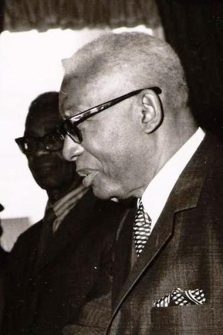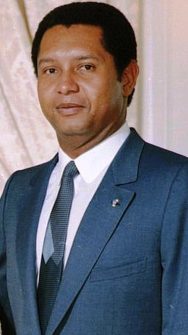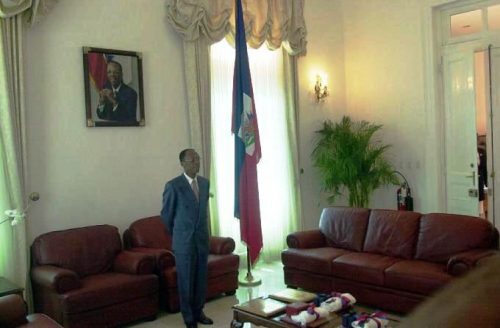From Baby Doc to Aristide.

The occupation of the country implemented by Washington opened the way for big US capital eager to extend their control over the sugar cane plantations and other sources of wealth.
Washington, in particular, took care to secure its investments by establishing an impressive police force with the task of guaranteeing order and peace but above all the defence of the interests of its capital. However, it is important to reiterate that the reasons for the US military occupation did not only concern the strictly commercial aspect but also the strategic military aspect due to the fact that, following the opening of the Panama Canal, Haiti had assumed an extremely privileged position for the control of the routes that passed through the Caribbean Sea. Securing control of the island would have guaranteed the United States the power to maintain the security of the Caribbean routes.
The American occupation, which ended in 1934, however, gave the Haitians a country with some more infrastructure but with an economy in tatters. A country literally on its knees that would soon force its inhabitants to migrate to nearby Santo Domingo to find work in the sugar cane plantations. Competition with local workers and a deep-rooted racist spirit resulted in ethnic cleansing that caused 20,000 Haitian victims by the Dominican army.

François Duvalier, also known as Papa Doc, was the president of Haiti from 1957 until his death in 1971. File archive
The corpses collected from a small river that flows on the border between the two countries led those who wanted to keep the memory of that vile extermination alive, to rename the waterway with the name of Riviére du Massacre.
The economic crisis in Haiti lasted until the 1940s. Furthermore, the end of the US occupation led to a resumption of conflict between mulattoes and blacks with the army beginning to take on an increasingly marked role in the political life of the country.
In 1946, Dumarsais Estimé, a supporter of the black cause, rose to the presidency but his commitment to remedying the country’s inequalities was strongly opposed by both the mulatto elite and the army, both supporters of a corrupt government. In 1949 a military junta led by Paul Magloire deposed the President in office, grabbing power and maintaining it until the 1957 elections which decreed the rise of Francois Duvalier, known as the “Doc Pope”. The latter, who presented himself to his electorate with a rather exotic program, imbued with mystical, racist and nationalist elements, governed in a dictatorial manner supported by US military and financial aid. In 1964 he declared himself President for life and upon his death in 1971, he was succeeded by his son Jean-Claude Duvalier, known as “Baby Doc”.
The period mentioned was truly terrible for Haiti which transformed into a deadly place where ethnic confrontation became increasingly bloody and exacerbated. Those were the years of violence, looting, torture, human burnings and hangings practiced by the paramilitaries of the “Tonton Macoutes”, a death squad created by “Papa Doc” to eliminate his political opponents and all those who dared to put his regime in a bad light. They were almost three decades of theft, corruption, state terrorism, persecution, torture, poverty, and social marginalization throughout the country. This series of factors caused a popular uprising in 1986 which, in addition to throwing the country definitively into chaos, forced the President into exile. Power passed into the hands of the army and the presidency was entrusted to Henry Namphy, a lieutenant very close to Duvalier who was also ousted in the following years by another coup d’état.

Jean-Claude Duvalier, nicknamed “Baby Doc” was the President of Haiti from 1971 until he was overthrown by a popular uprising in February 1986. File Archive
However, the dismissal of Jean-Claude Duvalier “Baby Doc” did not lead to the suppression of the Tonton Macoutes paramilitary group which, while still active, recycled itself in more death squads, and then later merged into the Front for the Advancement and Progress of Haiti (FRAPH), a creation of the Central Intelligence Agency (CIA).
In the meantime, a popular movement of Catholic origin led by Father Jean-Bertrand Aristide, a spokesperson for liberation theology, began to make headway in the country. Father Aristide became an important voice for most of Haiti’s poor; a popularity that pushed him to go beyond his mission and take to the field, running for leadership of the country with a new formation he founded himself, the “Front National pour le Changement et la Démocratie”.
In 1991 Aristide, defeating Marc Bazin – the US-backed candidate and former World Bank official – in free elections with 67% of the votes, won the presidency of Haiti. However, despite his success, the new president lasted only a few months in office since on 29 September 1991 he was overthrown in a military coup and was consequently exiled, first to Venezuela and then to the USA. According to the theories of careful observers, it would seem that the reason for this coup was to be found in the intense anti-drug campaign that the President had tried to implement and in his opposition to neo-liberal policies. A few years later, Aristide was allowed by Bill Clinton (recently elected President) to return to his homeland. In the meantime, the pressure exerted by the international community, together with Resolution no. 940 of the United Nations Security Council of 31 July 1994, convinced the military regime to resign while US troops were deployed in Haiti by order of Clinton. Returning to his homeland, Aristide was able to continue his mandate on the condition, however, of carrying out the economic program of the World Bank and the International Monetary Fund (IMF), terms and conditions which he accepted and which allowed him to return to Haiti with 20,000 US soldiers in stand-by for the transition where he remained in power until the 1996 elections when he was succeeded by René Préval. He regained office in the 2001 elections but, only a few years later, in 2004, he was eliminated again by a new coup d’état that broke out in the midst of a political crisis that forced him into exile.

Jean-Bertrand Aristide won the 1990–91 Haitian general election, with 67% of the vote. He was briefly president until a September 1991 military coup. Aristide was president again from 1994 to 1996 and from 2001 to 2004. He was ousted in the 2004 coup d’éta. Photo: Daniel Morel
It is easy to understand how the end of Aristide’s Presidency was part of a very broad geopolitical, geostrategic and geoeconomic logic. In fact, Aristide, although initially accepting the IMF’s conditions, had however refused to implement the privatization of companies and moved the geopolitical centre of gravity towards the south, establishing a network of relationships with the governments of Chàvez and Castro. Furthermore, his range of action did not stop at the continent alone. The President, in fact, began to court the new poles of power.
Following the coup, Resolution No. 1542 was approved by the United Nations Security Council whose purpose was to train the Haitian National Police force and to provide peace and security for the population. Thus, a Provisional Multinational Force (FMP) was sent to the country, initially formed by the United States, France, Canada and Chile and which, upon the expiry of its mandate, was replaced in 2004 by a special mission, the MINUSTAH (Mission of the Nations United for the Stabilization of Haiti). (Open Photo: Presidential Palace. Photo: Daniel Morel)
F. R.



